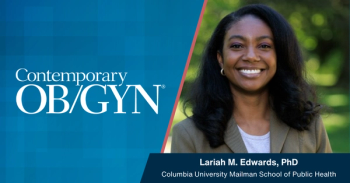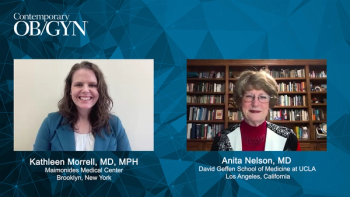
Lariah M. Edwards, PhD, explains how avoiding risky ingredients in care products may lower health risks while highlighting the need for stronger safety regulations.

Lariah M. Edwards, PhD, explains how avoiding risky ingredients in care products may lower health risks while highlighting the need for stronger safety regulations.

A study found that judicious prenatal opioid prescribing does not substantially increase the risk of autism or ADHD in children.

A study using objective Doppler measures shows that more active fetuses are associated with stronger maternal-fetal bonds.

New research suggests women with a history of cervical cancer face elevated anal cancer risk, highlighting the need for expanded screening guidelines.

New data reveal that more than 70% of Gen Z women report age-related fertility concerns, with experts urging education, proactive planning, and supportive language to reduce panic.

Jesus Gonzalez Bosquet, MD, PhD, discusses how machine learning could improve early ovarian cancer diagnosis by identifying methylated DNA in blood.

Uma Mahadevan, MD, explains updated international recommendations for inflammatory bowel disease in pregnancy.

A new study finds less than 16% of US counties offer vaginal birth after cesarean services, highlighting regional disparities.

Panelists discuss how the "if it's not broken, don't fix it" approach guides contraceptive continuation decisions, emphasizing the importance of directing patients to reliable online resources such as Bedsider.org to combat misinformation and support informed decision-making.

Panelists discuss how breakthrough bleeding affects approximately 20% of users initially but improves over time and can be managed through patient education about expectations, nonsteroidal anti-inflammatory drugs (NSAIDs) for acute episodes, and adjustments to estrogen dose or progestin type when necessary.

Panelists discuss how providers can utilize resources like Postpartum Support International for training, certification, and referrals, while building community networks and making warm handoffs to ensure patients receive appropriate care without barriers.

Panelists discuss how shortened hormone-free intervals (24-4 and 24-2-2 regimens) prevent ovarian reactivation and endometrial proliferation that caused breakthrough bleeding with traditional 21/7 formulations, while addressing how amenorrhea can be viewed as either a desired therapeutic outcome or concerning adverse effect depending on patient preferences.

Panelists discuss how misconceptions about lower efficacy and increased drug interactions persist with low-dose estrogen pills, while adverse effects such as headaches and nausea are managed through anticipatory guidance and proper counseling without creating unnecessary anxiety.

New research reveals that pregnant women living in socioeconomically disadvantaged neighborhoods face a significantly higher risk of developing gestational diabetes.

An expert discusses how the ideal vasomotor symptom treatment would address both symptoms and bone loss simultaneously, making nonestrogen therapies with skeletal benefits like elinzanetant particularly attractive for patients.

An expert discusses how pooled clinical trial data shows fezolinetant does not cause weight gain or body mass index changes, though specific weight and muscle mass studies are not yet published

Discover practical strategies for clinicians to assist pregnant patients impacted by care restrictions, including travel guidance, emotional support, and resource access.

A new study reveals that restrictive post-Dobbs abortion laws are preventing doctors from providing necessary care, resulting in avoidable harm to pregnant patients.

Panelists discuss how new FDA-approved treatments like zuranolone offer rapid onset options for postpartum depression, while monitoring effectiveness requires regular follow-up, rescreening, symptom assessment, and addressing global factors like sleep support and breastfeeding pressures.

Panelists discuss how treatment barriers include limited prescriptive access and long wait times, while successful treatment plans require assessing severity levels, maternal functioning, support systems, and incorporating follow-up care with appropriate interventions based on the patient’s specific needs.

Panelists discuss how the drospirenone/estetrol (E4) pill with 14.2 mg of estrogen provides effective contraception with a long half-life progestin that accommodates typical user behavior, while explaining that milligram vs microgram dosing reflects different estrogen metabolism rather than higher exposure.

Panelists discuss how the norethindrone acetate/ethinyl estradiol pill with 10 mcg of estrogen became the best-selling branded pill in the US due to its effective 24/2/2 formulation that minimizes bleeding issues through reduced placebo days and low-dose estrogen support.

By analyzing electronic health records, researchers such as Marina Sirota, PhD, and Umair Khan have uncovered hundreds of conditions linked to endometriosis.

An expert discusses how fezolinetant appears to have neutral effects on bone density and bone health based on current 52-week study data in postmenopausal women.

An expert discusses how the OASIS-3 subanalysis provides intriguing evidence for potential long-term bone health benefits from elinzanetant alongside vasomotor symptom treatment, warranting further research.

A new study using advanced pregnancy preference measures reveals that heavy alcohol use significantly increases the risk of unintended pregnancy, highlighting the need for personalized contraceptive support.

Panelists discuss how to manage positive screens through resources like Postpartum Support International, state psychiatric consultation lines, combination therapy approaches, and addressing patient concerns about medication through evidence-based conversations and gradual implementation.

Panelists discuss how to overcome patient reluctance to discuss postpartum depression through normalization, early conversations during pregnancy, comprehensive screening integration, and addressing stigma by comparing mental health treatment with other medical conditions.

Panelists discuss how estrogen dosing selection depends on individual patient factors, including cycle control needs, noncontraceptive goals, estrogen sensitivity, age considerations for bone health, and patient comfort with hormone levels, with most providers using lower doses primarily to address estrogen-related adverse effects.

Panelists discuss how ideal candidates for combined hormonal contraceptives are those medically cleared for estrogen use who prefer predictable monthly periods, while progestin-only methods are recommended for patients with estrogen contraindications such as elevated body mass index (BMI) combined with older age or hypertension with migraines.